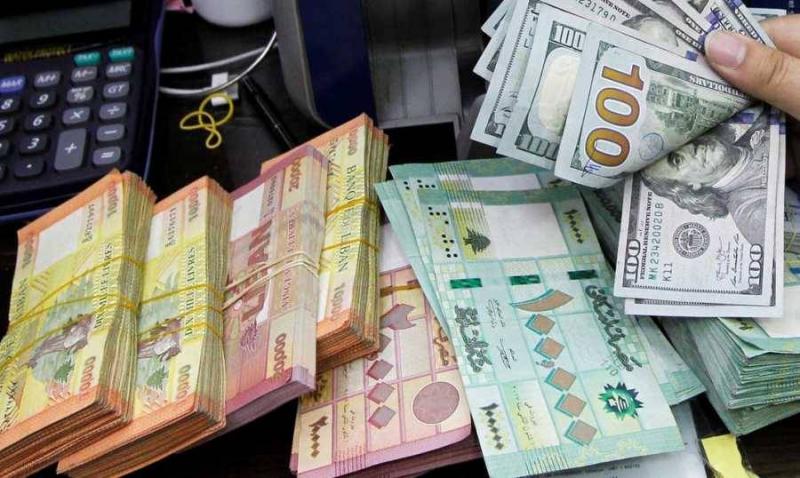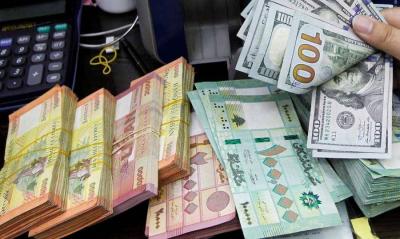The tragedies of the Lebanese people continue, with their living, economic, and financial crises exacerbated by the rampant exchange rate of the dollar in the black market. Meanwhile, the authorities remain confused, trapped in a cycle of patchwork policies, unable to take any reformative step that could curb the rolling collapse affecting various sectors of the national landscape. Instead, they continue to rely on an agenda that undermines citizens’ rights and burdens them with new tax liabilities, with their current objective focused on raising the customs dollar to enhance their ability to withstand and remain in power.
However, in light of the widespread opposition to the proposed exchange rate of 20,000 LBP suggested by caretaker Prime Minister Najib Mikati, well-informed sources confirmed the "braking" of the customs dollar increase for now, pending the establishment of a new negotiated rate between the three presidents, which would allow the Shiite duo to greenlight the Minister of Finance's inclusion of the "third signature" alongside the signatures of the President and the Prime Minister on the decree. In this context, they anticipated a return to a new customs rate of 12,000 LBP, which "Nidaa al-Watan" had detailed at the beginning of August.
However, the same sources emphasized that "based on pure scientific financial metrics and considering the upcoming financial obligations on the state, especially regarding the promised increases to improve public sector salaries, any customs rate below 20,000 LBP will not be able to balance the state's revenues and its obligations." They stressed that "there is no escape for the authorities but to resort to printing the Lebanese pound to save themselves and fulfill their commitments to prevent a comprehensive collapse of official institutions, knowing that this would lead to inflation reaching record levels that would soon absorb any salary increases for public sector employees."
In a related context, an important meeting took place between caretaker Prime Minister Najib Mikati and a delegation from the economic bodies. Sources within the meeting told “Al-Jomhouria” that the discussion was very frank, addressing all details related to the customs dollar and the need to raise it to enable the state to continue, at least to ensure the salaries of employees. They noted that maintaining the current situation with the dollar at 1,500 LBP would exacerbate the financial disaster, driving it to even deeper depths.
Sources indicated that Prime Minister Mikati stressed the need to raise the customs dollar to enable the government to meet the country's needs, but he did not commit to a specific figure. The bodies confirmed their support for a solution they deemed the safest at this stage and the least burdensome for the Lebanese citizen, proposing to raise the customs dollar to around half the suggested value, i.e., a maximum of 10,000 LBP instead of 20,000 LBP, which could lead to very serious social repercussions.
Former Minister Mohammad Choucair, head of the economic bodies, stated after the meeting: "Our position on the customs dollar has not changed as we announced eight months ago; we requested that the customs dollar be set between 8,000 and 10,000 LBP at most. We reiterated our stance during the meeting and expressed observations regarding some matters, including the issue of cars, where equality in the customs dollar rate across all vehicles must be avoided."
In response to a question, he added, “It is unacceptable for the government to throw the issue to the Parliament and for the Parliament to in turn throw it back at the government. It is a crime for the customs dollar to remain at a rate of 1,500 LBP per dollar, as we see that all state institutions are paralyzed, and the state cannot continue at this rate, nor can it ensure the salaries of public sector employees.”
He announced that Mikati clarified that the issue requires a legislative proposal from Parliament, and Parliament must decide on it, which is what will happen. "I hope that the honorable MPs will make this decision as soon as possible, as we must not forget the public sector employees who suffer injustice, and their situations should be rectified. It is criminal for their conditions to remain unchanged."
On another note, "Al-Anbaa" electronic news indicated that it seems what is happening in Lebanon is from a different world; there are no observations from the authorities to detect it or telescopes to capture what is happening. Everything in Lebanon goes unseen by the eyes of officials, and not a single grain of responsibility is moved. Concerns lie elsewhere, and calculations do not match those of the citizen, who finds themselves once again in yet another queue, either in front of a gas station or a bakery, and tomorrow in front of a supermarket, assuming they have money left after the continuous rise of the dollar.
Worse still, with the relevant parties absent from any solutions, informed sources warn that what Lebanon is experiencing today is the beginning of the crisis, not its end, and that the situation is deteriorating as long as no one in power properly understands the magnitude of the catastrophe facing the Lebanese. Each sector of the state sings its own tune.
The same sources pointed out two matters to "Al-Anbaa" electronic news: First, the announcement by caretaker Prime Minister Najib Mikati to refer the customs dollar project to Parliament, which means burying it in the graveyard of joint committees and, consequently, failing to secure financial revenues to pay public sector employees' salaries, leading to the continuation of their strike, which has lasted for nearly two months. The second issue is the return of queues in front of fuel stations. This confirms that the crisis is in its early stages and that discussions about a near-term solution are highly exaggerated.




